 W
WAbakaliki is the capital city of Ebonyi State in southeastern Nigeria, located 64 kilometres (40 mi) southeast of Enugu. The inhabitants are primarily members of the Igbo nation. It was the headquarters of the Ogoja province before the creation of the Southeastern State in 1967.
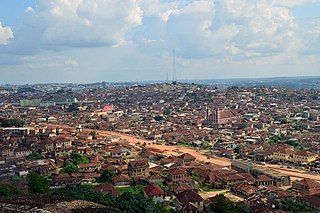 W
WAbeokuta is the state capital of Ogun State in southwest Nigeria. It is situated on the east bank of the Ogun River, near a group of rocky outcrops in a wooded savanna; 77 kilometres (48 mi) north of Lagos by railway, or 130 kilometres (81 mi) by water. As of 2006, Abeokuta and the surrounding area had a population of 449,088.
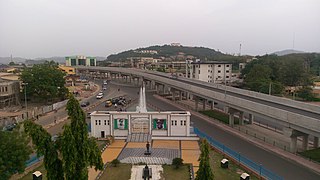 W
WAdo Ekiti is a city in southwest Nigeria, the state capital and headquarters of the Ekiti State. The population in 2006 was 308,621. The people of Ado Ekiti are mainly of the Ekiti sub-ethnic group of the Yoruba and Edo peoples. Edo-Ekiti or Ado-Ekiti as it is now known is often categorized under the Yoruba ethnic group as a result of acculturation over the last few centuries. Ado Ekiti City has a State owned University - the University of Ado Ekiti now Ekiti State University Ado-Ekiti, a privately owned University - Afe Babalola University Ado-Ekiti, a Polytechnic - the Federal Polytechnic, Ado-Ekiti, Federal University Oye, FUOYE, Oye-Ekiti, privately owned polytechnic Crown polytechnic, Odo, Ado-Ekiti two local television and radio stations, Nigeria Television Authority Ado Ekiti, Ekiti State Television (BSES), Radio Ekiti, Progress FM Ado Ekiti. One private Radio Voice fm Various commercial enterprises operate in Ado Ekiti. The city is the trade centre for a farming region where yams, cassava, grain, and tobacco are grown. Cotton is also grown for weaving.
 W
WAkure is a city in south-western Nigeria, and is the largest city and capital of Ondo State. The city had a population of 484,798 as at the 2006 population census.
 W
WAsaba is a city located at the western bank of the Niger River. It is the capital of Delta State, Nigeria and one of the 3 towns of Oshimili South Local Government Area, A fast developing urban area, Asaba had a population of 149,603 as at the 2006 census, and a metropolitan population of over half a million people. Asaba is well known for social activities due to the presence of large people and social amenities such as hotels, clubs, cinemas, malls, event centre, etc. It holds a yearly program named Delta Yaddah which always host series of gospel singers among others. Due to its large population, crime rate is high. Crimes such as pick pocketing, sideways robbery, etc, is rampart in Asaba. Because of the existence of foreigners in the state, cost of living is high in Asaba. The Onitsha bridge is the boundary between Delta and Anambra state, as the bridge separates Asaba and Onitsha.
 W
WAwka is the capital city of Anambra State, Nigeria. The city was declared capital on 21 August 1991, after the creation of Anambra and Enugu state, which moved the capital from Enugu to Awka. The city has an estimated population of 301,657 as of the 2006 Nigerian census, and over 2.5 million as of a 2018 estimate. The city is located 199.1 kilometres (123.7 mi), by road, directly north of Port Harcourt in the centre of the densely-populated Igbo heartland in south east Nigeria.
 W
WBauchi is a city in northeast Nigeria, the capital of Bauchi State, of the Bauchi Local Government Area within that State, and of the traditional Bauchi Emirate. It is located on the northern edge of the Jos Plateau, at an elevation of 616 m. The Local Government Area covers an area of 3,687 km2 and had a population of 493,810 at the time of the 2006
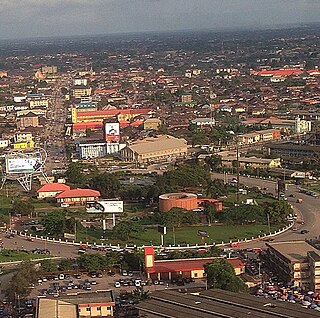 W
WBenin City is the capital, and largest city of Edo State in southern Nigeria. It is situated approximately 40 kilometres (25 mi) north of the Benin River and 320 kilometres (200 mi) by road east of Lagos. Benin City is the centre of Nigeria's rubber industry, and oil production is also a significant industry.
 W
WBirnin Kebbi is a city located in northwestern Nigeria. It is the capital city of Kebbi State and headquarters of the Gwandu Emirate. As of 2007 the city had an estimated population of 125,594. Kebbi is mostly a Hausa and Fulani state, with Islam as the major religion. Formerly it was the capital of the Kebbi Emirate, which relocated to Argungu after the conquest by Gwandu in 1831.
 W
WCalabar is the capital of Cross River State, Nigeria. It was originally named Akwa Akpa, in Efik language. The city is adjacent to the Calabar and Great Kwa rivers and creeks of the Cross River.
 W
W W
WEnugu is the capital of Enugu State in Nigeria. It is located in southeastern Nigeria. The city had a population of 722,664 according to the 2006 Nigerian census. The name Enugu is derived from the two Igbo words Énú Ụ́gwụ́ meaning "hill top" denoting the city's hilly geography. The city was named after Enugwu Ngwuo, under which coal was found. Enugwu Ngwuo is one of the ten villages that made up the Ngwuo clan, often referred to as the children of Ngwuako, the ancestral founder of the clan. Ngwuako positioned Udeneogu, his warrior son of on top of the hill (Enu-Ugwu) to protect the clan from invaders. Enugwu Ama Udeneogu, The people lived on the hilltop and farmed the sprawling surrounding valleys. Ngwuo has borders with Oshie clan in the south, Ojebeogene clan in the north and Nkanu clan in the east. The discovery of coal deposits on Enugwu Ngwuo farm lands down the valley, attracted people from all and sundry to the newly discovered wealth, in search for means of living, and as depicted in the map of the original plan for a government station, titled Enugwu Ngwo government station, this marked the core of the first urban settlement of what is today known as Enugu, started on Ngwuo land and it was called Enugwu Ngwuo until when it attained township status, the word Ngwo was removed for the convenience of pronunciation, thus a village of Ngwuo clan gave birth to a city which today has grown into a mega city, and still growing, engulfing the surrounding Nkanu towns of Nike and Akunino and stretching towards Neke and Emene.
 W
WGombe is the capital city of Gombe State, north-eastern Nigeria, with an estimated population of 261,536. The city is the headquarters of the Gombe Emirate, a traditional state that covers most of Gombe State. Recent developments include an electrical generation operation forming the basis for the Dadin Kowa water project and the opening of the new Gombe Lawanti International Airport serving Gombe State.
 W
WGusau is a city and Local Government Area located in northwestern Nigeria. It is the capital of Zamfara State.
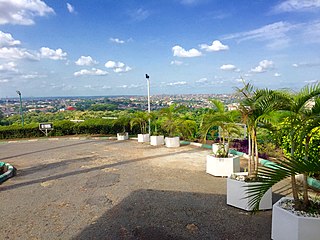 W
WIbadan is the capital and most populous city of Oyo State, Nigeria. With a population of over 6 million, it is the third most populous city in Nigeria after Lagos and Kano; it is the country's largest city by geographical area. At the time of Nigeria's independence in 1960, Ibadan was the largest and most populous city in the country, and the second most populous in Africa behind Cairo.
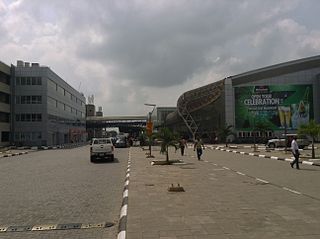 W
WIkeja is the capital of Lagos State in southwestern Nigeria. Its population, as of 2006 census, is 313,196. Prior to the emergence of military rule in the early 1980s, Ikeja was a well planned, clean and quiet residential and commercial town with shopping malls, pharmacies and government reservation areas. The Murtala Muhammed International Airport is located in Ikeja. Ikeja is also home to Femi Kuti's Africa Shrine and Lagbaja's Motherland, both venues for live music. Its Ikeja City Mall is the largest mall on the Lagos State mainland. Ikeja also has its own radio station, broadcasting both in English and in Yoruba.
 W
WIlorin is the state capital of Kwara in Western Nigeria. As of the 2006 census, it had a population of 777,667, making it the 7th largest city by population in Nigeria.
 W
WItapa Ekiti is a town in Ekiti State, Nigeria, of which the Owatapa is the ruler. Itapa is one of the goddesses worshipped at Ife. Her festival, known as Utaale, is held for a period of thirty days and she has been worshipped by Ooni and his people till today.
 W
WJalingo is the capital city of Taraba State in north eastern Nigeria, named in fulfulde (The word jalingo meaning superior place and has been estimated with population of 118,000.
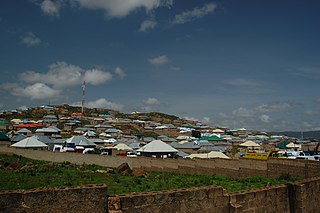 W
WJos is a city in the Middle Belt of Nigeria. The city has a population of about 900,000 residents based on the 2006 census. Popularly called "J-Town", it is the administrative capital and largest city of Plateau State.
 W
WKaduna is the state capital of Kaduna State in north-western Nigeria, on the Kaduna River. It is a trade centre and a major transportation hub for the surrounding agricultural areas, with its rail and road junction. The population of Kaduna was at 760,084 as of the 2006 Nigerian census.
 W
WKano is the capital city of Kano State in North West zone of Nigeria. It is in the Sahelian geographic region, south of the Sahara. Kano is the commercial nerve centre of Northern Nigeria and is the second-largest city in Nigeria. The Kano metropolis initially covered 137 square kilometres and comprised forty four local government areas (LGAs)—Kano Municipal, Fagge, Dala, Gwale, Tarauni and Nasarawa; however, it now covers two additional LGAs—Ungogo and Kumbotso. The total area of Metropolitan Kano is now 499 square kilometres, with a population of 2,828,861 as of the 2006 Nigerian census; the latest official estimate is 3,931,300.
 W
WKatsina is a Local Government Area and the state capital of Katsina State in northern Nigeria. Katsina is located some 260 kilometres (160 mi) east of the city of Sokoto and 135 kilometres (84 mi) northwest of Kano, close to the border with Niger. In 2016, Katsina's estimated population was 429,000. The city is the centre of an agricultural region producing groundnuts, cotton, hides, millet and guinea corn and also has mills for producing peanut oil and steel. The city is largely Muslim, and the population of the city is mainly from the Fulani and Hausa ethnic groups.
 W
WLafia is a town in North Central Nigeria. It is the capital city of Nasarawa State and has a population of 330,712 inhabitants according to the 2006 census results. It is the largest town in Nasarawa state.
 W
WLokoja is a city in Nigeria. It lies at the confluence of the Niger and Benue rivers and is the capital of Kogi State. While the Oworo, Bassa Nge and Nupe are indigenous to the area, other ethnic groups of Nigeria, including the Hausa, Ebira, Igala, Igbo, Bini/Edo, and Tiv have recently established themselves.
 W
WMaiduguri is the capital and the largest city of Borno State in north-eastern Nigeria. The city sits along the seasonal Ngadda River which disappears into the Firki swamps in the areas around Lake Chad. Maiduguri was founded in 1907 as a military outpost by the British and has since grown rapidly with a population exceeding a million by 2007.
 W
WMakurdi is the capital of Benue State, located in eastern Nigeria, and part of the Middle Belt region of central Nigeria. The city is situated on the south bank of the Benue River. In 2016, Makurdi and the surrounding areas had an estimated population of 365,000.
 W
WMinna is a city in Middle Belt Nigeria. It is the capital of Niger State, one of Nigeria's 36 federal states. It consists of 2 major ethnic groups: the Nupe and the Gwari.
 W
WOsogbo is a city in Nigeria. It became the capital city of Osun State in 1991. Osogbo city seats the Headquarters of both Osogbo Local Government Area and Olorunda Local Government Area. It is some 88 kilometers by road northeast of Ibadan. It is also 108 kilometres (67 mi) by road south of Ilorin and 108 kilometres (67 mi) northwest of Akure. Osogbo shares boundaries with Ikirun, Ilesa, Ede, Egbedore, Ogbomosho and Iragbiji and is easily accessible from any part of the state because of its central nature. It is about 48 km from Ife, 32 km from Ilesa, 46 km from Iwo, 48 km from Ikire and 46 km from Ila-Orangun; The city had a population of about 499,999 people and an approximate land area of 2875 km2 the postal code of the area is 230.
 W
WOwerri is the capital of Imo State in Nigeria, set in the heart of Igboland. It is also the state's largest city, followed by Orlu and Okigwe as second and third respectively. Owerri consists of three Local Government Areas including Owerri Municipal, Owerri North and Owerri West, it has an estimated population of about 1,401,873 as of 2016 and is approximately 100 square kilometres (40 sq mi) in area. Owerri is bordered by the Otamiri River to the east and the Nworie River to the south.
 W
WSokoto is a major city located in the extreme northwest of Nigeria, near the confluence of the Sokoto River and the Rima River. As of 2006 it has a population of 427,760. Sokoto is the modern-day capital of Sokoto State and was previously the capital of the north-western state.
 W
WUmuahia is the capital city of Abia State in southeastern Nigeria. Umuahia is located along the rail road that lies between Port Harcourt to its south and Enugu city to its north. Umuahia has a population of 359,230 according to the 2006 Nigerian census. Umuahia is indigenously Igbo.
 W
WUyo is the state capital of Akwa Ibom, in South South Nigeria. The city became the capital of the state on September 23, 1987 following the creation of Akwa Ibom State from erstwhile Cross River State. The University of Uyo Main campus is located at Nwaniba, While the Town campus and Annex campus are located along Ikpa road. The population of Uyo, according to the 2006 Nigerian Census which comprises Uyo and Itu, is 427,873. while the urban area, including Uruan, is 554,906. with Ibibio language as its major indigenous language
 W
WYenagoa is a Local Government Area in Bayelsa State, Nigeria. Its headquarters are in the town of Yenagoa in the south of the area at 4°55′29″N 6°15′51″E.
 W
WYola, meaning 'Great Plain' or 'Vast Plain Land', is the largest city, capital city and administrative center of Adamawa State, Nigeria. Located on the Benue River, it has a population of 336,648 (2010). Yola is split into two parts. The old town of Yola where the Lamido resides is the traditional city but the new city of Jimeta is the administrative and commercial centre. Generally the term Yola is now used to mean both. To the north are the Mandara Mountains and the south are the Shebshi Mountains with Dimlang (Vogel) Peak the second highest point in Nigeria after Chappal Waddi. Yola is an access point to the Gashaka Gumpti Nature Reserve, which is the largest national park in Nigeria, the Ngel Nyaki montane forest reserve, the Mambilla Plateau, The Sukur UNESCO World heritage site, which is Africa's first cultural landscape to receive World Heritage List inscription, The Yadin Waterfalls, The Kiri Dam on the Gongola River, The Benue national park in nearby Cameroon, The Waza National Park, and Cameroonian town of Garoua, which lies across the border, on the Benue river.